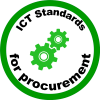The contents included in this section are DRAFTS and are under review.
eGovernment refers to the delivery of national or local government information and services via the Internet or other digital means.
eGovernment uses digital tools and systems to provide better public services to citizens and businesses. Effective eGovernment can provide a wide variety of benefits, including more efficiency and savings for governments and businesses, increased transparency, and greater participation of citizens in political life.
While Information Communication Technologies (ICTs) are already widely utilised by government bodies, eGovernment involves much more than just the technical tools. It also involves rethinking organisations and processes, and changing behaviour so that public services are delivered more efficiently to people. If implemented correctly, eGovernment enables citizens, enterprises and organisations to interact with government more easily, faster and at lower costs.
Sub Domains
Subdomains describe specific cases of the application of ICT solutions in the eGovernment domain. Selected cases for eGovernment are:
| eProcurement | Click to open |
While not considered a sub-domain, CEF Building Blocks are also included within the eGovernment domain. Based on existing formalised technical specifications and standards, the CEF building blocks are intended to facilitate the adoption of common technical specifications by public administrations.
The CEF building blocks offer basic capabilities that can be used in any European project to facilitate the delivery of digital public services across borders, and are based on existing formalised technical specifications and standards. Currently, the following building blocks are available:
| Building Block | Description |
|---|---|
| eDelivery | CEF eDelivery helps public administrations exchange electronic data and documents with other public administrations, businesses and citizens, in an interoperable, secure, reliable and trusted way. |
| eID | CEF eID helps public administrations and private online service providers to easily extend the use of their online services to citizens from other EU Member States. |
| eSignature | CEF eSignature helps public administrations and businesses to accelerate the creation and verification of electronic signatures. |
| eInvoicing | eInvoicing represents a clear example of how digital innovation can provide efficiencies and cost-cutting measures that are of tangible benefit to public administrations, citizens and businesses throughout Europe. |
| Translation | CEF Automated Translation is at the heart of the eTranslation service; helping European and national public administrations exchange information across language barriers in the EU. |
For the purposes of the public consultation, a DRAFT list of standards (version 2, update 31/03/2017) applicable to the topics treated in this domain has been created and can be dowloaded for perusal and comments.
The review and consultation stage aims at: adding/removing items, classifying items as standards/technical specifications/others following appropriate regulations.
You contribution will be much appreaciated. Please leave your feedback in the forum.

Multipurpose Internet Mail Extensions - MIME (RFC 2049) - Multipurpose Internet Mail Extensions - MIME

Multipurpose Internet Mail Extensions - MIME (RFC 2048) - Multipurpose Internet Mail Extensions - MIME

Multipurpose Internet Mail Extensions - MIME (RFC 2047) - Multipurpose Internet Mail Extensions - MIME

Multipurpose Internet Mail Extensions - MIME (RFC 2046) - Multipurpose Internet Mail Extensions - MIME

(RFC 2045) - Multipurpose Internet Mail Extensions - MIME

ebCore - OASIS ebCore Party Id Type Technical Specification

CMS (RFC 5652 ex 3852) - Cryptographic Message Syntax (CMS)

S-MIME (RFC 3851) - Secure/Multipurpose Internet Mail Extensions (S/MIME) Version 3.1 Message Specification






